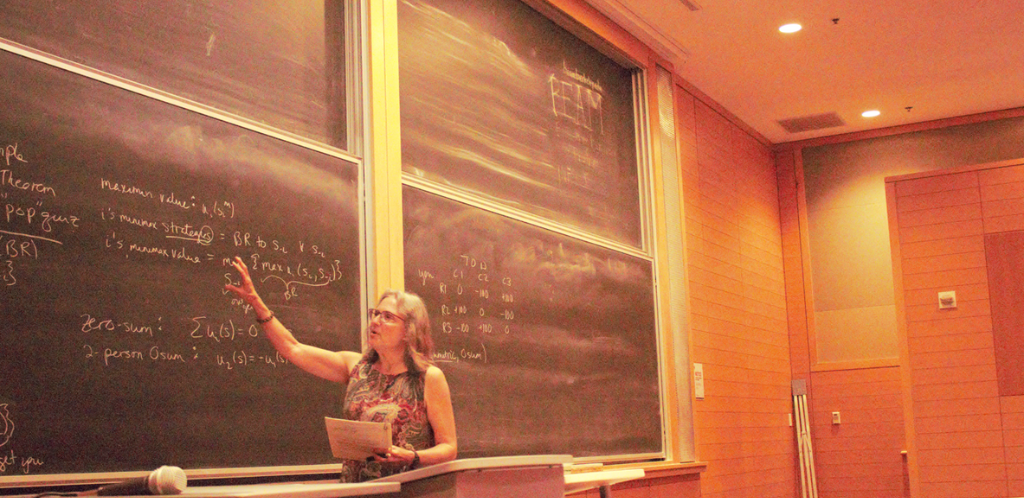When Mentorship Comes Full Circle: Professor Rhonda Righter Named Inaugural Ronald W. Wolff Chancellor's Chair

Thanks to the generous donation from IEOR Professor Emeritus and former department chair Ron Wolff, Rhonda Righter has been announced as the inaugural Ronald W. Wolff Chancellor's Chair in IEOR. Professor Wolff served as professor Righter's doctoral advisor when Righter was a Berkeley Ph.D. student, and he later co-advised students alongside Righter when she became a professor in the department. We sat down to talk with professor Righter and learn more about her journey to becoming one of IEOR's most beloved professors and her role in continuing professor Wolff's powerful legacy of mentoring students.
Born and raised near her great grandmother's farm alongside the D.C. border of Maryland, you can hear just the hint of a southern accent when professor Rhonda Righter talks, perhaps due to her upbringing near the Mason-Dixon line. Professor Righter's semi-southern roots might contribute to her welcoming demeanor, but her kindness and generosity go far beyond southern hospitality.
Ask any IEOR student or alumni about their favorite part of IEOR at Berkeley, and chances are, if they know Righter, their favorite memory will include her.
"Professor Righter goes out of her way to support and advocate for her students," said IEOR student Brian Ngan. "She stays late after class to answer all your questions and is always passionate about what she teaches. You cannot help but be engaged in her classroom." Professor Righter has received the department's Favorite IEOR Professor Award several times.
Between teaching classes, publishing research, and fulfilling faculty service duties, Righter mentors UC Berkeley Fiat Lux scholars and volunteers with the Society of Women Engineers (SWE) to help increase female and non-binary representation in science and STEM-related fields.
In 2021, the IEOR Department closed the gender gap among its undergraduate and master's degree students - a milestone Righter has been tirelessly working towards since she became faculty in 2003. But Righter actually first joined IEOR not as a professor but as a master's student from Bell Labs, where she worked after receiving her B.S. in Applied Mathematics from Carnegie Mellon University. After one year at Bell Labs, the company asked Righter to pursue her master's. They provided Cornell, UC Berkeley, Stanford, and John Hopkins as options to choose from.
"I wanted to go to California because I grew up on the East Coast. I just wanted to experience it," said Righter. "I chose Berkeley over Stanford after realizing that Stanford's master's program was separate from its PhD program. Berkeley IEOR combines its master's with its PhD program. I didn't expect to pursue my PhD, but I still thought the faculty would care more about their courses with PhD students."
A few months into pursuing her master's, Righter knew she had made the right decision. "I loved the intellectual community at Cal." Righter said. "I also love stochastic processes. As an undergraduate student, I used first-edition Sheldon Ross textbooks. He is famous for his textbooks. Then, when I got to IEOR, I started taking his classes! Sheldon Ross became my advisor. He is a fabulous teacher and researcher. It was so great to work with him."
When asked what she loves most about stochastic processes, Righter does not hesitate to answer: "The surprises and paradoxes. When everything is deterministic, you expect things to go a certain way, but when there is randomness, it can go completely the opposite way."
One of Righter's favorite examples is a flexible manufacturing system (FMS). Designed to manage production levels and to manufacture various parts, an FMS requires switchovers to change from making one type of product to another.
"Lean manufacturing says we should reduce switchover times to make a system more efficient. It turns out, that if there is randomness in a system, you can reduce those switchover times and actually worsen system performance! It's completely counterintuitive." Righter said. "In my classes, I often use the simpler example of bus lines. You can reduce the average time between buses and worsen passenger waiting times! It's very mind-bending, but once you understand the why, you can finally get started on how to make things better."
Righter is also a prolific researcher who publishes a number of articles every year, especially on the subject of queueing theory. This is where Emeritus Professor Ron Wolff emerges as one of Righter's most significant mentors and influences.
"Ron Wolff is a leader in queuing theory. I am a huge fan." Rhonda said. "When I was pursuing my doctorate, he was on my committee. I appreciated how he was always here with his door open. Ron always had the best advice, and I could always talk to him. When I returned to Berkeley as a professor, he was retired but still relatively active, and he would often co-advise students with me. He had so much wisdom to share."
Mentored by Ron during her time as a student, Righter has many stories about Spring picnics and holiday parties with Ron and the rest of her PhD cohort, where he would often bring his three labradors. "He always had at two or three at a time." Righter fondly remembered.
Wolff and Righter share a passion for teaching and genuine care for their students. They both continue to create a culture of belonging and community at IEOR. Perhaps this, and their affinity for quething theory, is what led to such a strong mentoring relationship turned friendship.
Most students will enthusiastically mention Righter if you ask what they enjoy most about IEOR. You will recognize that same enthusiasm when Righter talks about Ron Wolff - but with a hint of Righter’s unique mason-dixon twang.
Learn More
Read about Professor Emeritus Ron Wolff's milestone endowment here.